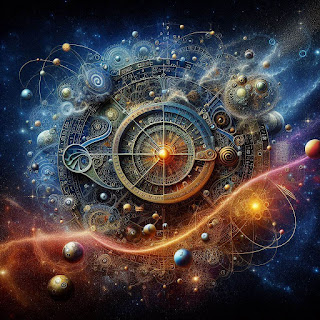Philosophy, Science, Mathematics and Design in the Universe
Philosophy, science, mathematics, and design are interconnected concepts that play a crucial role in our understanding of the universe. Each of these fields offers unique perspectives on the nature of reality, the underlying principles governing the universe, and the existence of design behind the intricate workings of the cosmos. The universe, as a vast and mysterious entity, is the ultimate canvas on which these disciplines converge and interact.
Philosophy, as the study of fundamental questions concerning existence, knowledge, values, reason, mind, and language, provides a framework for understanding the universe at a deeper level. Philosophers have long pondered questions about the nature of causality, the limits of human knowledge, the meaning of life, the nature of consciousness, free will, origins of the universe, the nature of reality, and the existence of higher power or intelligent being guiding the cosmos. Through critical analysis and logical reasoning, philosophers seek to unravel the mysteries of the universe and uncover the underlying principles that govern it.
Science, on the other hand, takes a more empirical approach to understanding the natural world. Through observation, experimentation, and the formulation of testable hypotheses, scientists seek to uncover the laws and mechanisms that govern the universe. By studying the natural world, scientists have gained a better understanding of the laws of physics, chemistry, biology, and astronomy. The universe itself is a vast and mysterious entity that has long captivated human imagination. From the stars in the night sky to the smallest particles in the atom, the universe is a realm of infinite complexity and beauty. Through the study of astronomy, astrophysics, and cosmology, scientists continue to unravel the mysteries of the universe and our place within it.
Through the language of mathematics, scientists can describe the relationships, patterns, and structures that govern the universe. It serves as a powerful tool for describing and understanding the universe through the language of numbers, shapes, and patterns. The intricate mathematical laws that govern the movements of celestial bodies, the structure of molecules, and the behavior of particles at the subatomic level reveal a deep connection between mathematics and the physical world. Mathematicians use abstract concepts and rigorous proofs to uncover the hidden symmetry and order within the universe, shedding light on the complex relationships that underlie the fabric of reality. Mathematical equations and formulas are used to predict the behavior of physical systems and describe the relationships between different phenomena. Mathematicians also explore abstract concepts such as infinity, symmetry, and geometry, which have deep philosophical implications for our understanding of the universe. The precision and predictability of mathematical models are cited as evidence of an underlying intelligence or design in the universe.
Prevalence of design offers a different perspective on the nature of reality. The complexity and orderliness of the universe cannot be solely attributed to chance or natural processes but must have been guided by an Intelligent Designer. From the spiral galaxies to the fractal patterns found in nature, the universe exhibits a sense of beauty and harmony. Intricate design of living organisms, the fine-tuning of physical constants in the universe, and the complexity of biological systems is evidence of intelligent design at work. The incredible complexity and fine-tuning of the universe point to the presence of intelligent design and purpose behind the cosmos.
The intersection of philosophy, mathematics, and design in the study of the universe raises profound questions about the nature of reality, the existence of underlying principles governing the cosmos, and the presence of Intelligent Being guiding and maintaining its perpetuation. Philosophical inquiry into the origins and nature of the universe prompts us to explore fundamental questions about existence, meaning, and purpose, while mathematical analysis reveals the hidden order and symmetry that pervade the universe. Intelligent design offers a different perspective on the intricate workings of the cosmos, suggesting that the complexity and diversity of life and the universe are best explained by the presence of an Intelligent Designer.
In conclusion, philosophy, science, mathematics, and design offer complementary perspectives on the nature of the universe, each shedding light on different aspects of reality and raising profound questions about the underlying principles governing the cosmos. By combining insights from these fields, we can gain a deeper understanding of the intricate workings of the universe, the hidden order and symmetry that pervade it, and the presence of intelligent design guiding its perpetuation. The intersection of philosophy, science, mathematics, and design in the study of the universe invites us to contemplate the ultimate questions of existence, purpose, and the nature of reality, challenging us to explore the mysteries of the cosmos, our place within it and uncover the deeper truths that lie at the heart of the universe.
Points to Ponder:
Can we ignore perspectives from philosophy, Science, Mathematics or design and get accurate understanding of the universe?
https://youtu.be/mC1h1L6Rbyg




Comments
Post a Comment